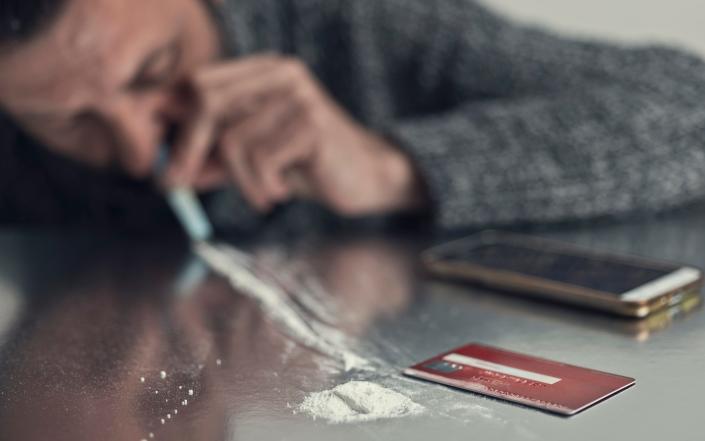
Only one in seven offenders caught with Class A drugs such as cocaine are prosecuted for possession, according to Home Office figures.
Data reveals that the proportion charged with possession of drugs other than cannabis has fallen from more than half (51.9%) eight years ago to less than four in 10 (39.2%) this year last.
However, this masks wide variation between police forces, with Surrey charging only 14.3% or just one in seven offenses for possession of drugs other than cannabis.
It has the lowest burden rate followed by West Mercia (15.7%), West Midlands (17.4%) and Hampshire (23.3%). This contrasts with 66% for the Met Police and over 50% for Humberside, Wiltshire, Staffordshire, North Yorkshire and Norfolk.
The decline follows a new approach quietly adopted by more than half of police forces in England and Wales where officers cannot pursue people caught in possession of illegal drugs for personal use for the first time, but rather give them the opportunity to undergo training or treatment. .
The police take no further action if they agree and the addict avoids a criminal record. The individual could however be prosecuted if he does not follow education or treatment and if he is again taken with drugs.
These “diversion” programs – treating personal drug use as a health issue rather than a crime – contributed to a similar drop in the proportion of cannabis possession offenses resulting in a charge, from 26.3 % in 2015 to 16% in 2022.
Surrey is the force with the lowest charge rate at just 6.8 per cent last year, followed by Hampshire (8.5 per cent), Thames Valley (8.6 per cent) and West Midlands (9.6 per cent). %). This contrasts with over 30% in Wiltshire, Cheshire and the City of London.
The moves could put police and public health chiefs on a collision course with the government, which has proposed a tough new “three strikes and out” approach to recreational drug use. This would see habitual users banned from traveling abroad, disqualified from driving or electronically tagged to quit their habit.
Opposition to decriminalization
On Friday, the Prime Minister reiterated his opposition to decriminalization after the SNP called for such a move for personal drug use. A source close to Home Secretary Suella Braverman described it as “irresponsible” and threatening “incalculable damage” to neighborhoods.
Surrey Police maintained their approach. In a statement, he said: “We know drug offenses are often part of a bigger picture, which is why it’s important that we look at the circumstances that lead someone to commit an offense and that we tackle the basic problems.
“An example of this includes diversionary tactics which can be used for first offenses and which have been shown to be more effective in reducing recidivism than prosecution.
“This could include a referral to a substance abuse treatment program or a restorative justice program for youth, which take a holistic, individual approach to preventing recidivism.”
Police chiefs said they have taken a tough approach to organized drug dealers and gangs, although drug trafficking prosecutions have halved since 2015, from 67.5% to 35.1% offenses last year. Police last week raided 1,000 cannabis farms and seized plants worth £130million.
“More options for officers”
Dr Richard Lewis, head of the National Police Chiefs Council on Drugs, said: ‘Police officers have more and more options available to them when dealing with individual drug possession, which can include eliminations at amicable, as well as bringing a formal charge, depending on individual circumstances.
“Drug diversion schemes exist within various forces across the UK, and assessments by officers when dealing with someone in possession of drugs are always made on a case-by-case basis depending on risk, threat and harm. It’s not new, nor is it universal in its application.
However, former police officer Rory Geoghegan, director of the Public Safety Foundation and former Councilor No 10, said: ‘The rush to diversion programs that often downplay the consequences of poor decisions may seem administratively practical for an inefficient and underfunded criminal justice system. system, but it fails the individual user and those affected by the health, environmental and criminal problems that illegal drug use generates.
“If we are to reduce drug abuse, we must ensure that those who are tempted to use illegal drugs have a more than minimal chance of being caught, and that being caught carries personal consequences. “
Broaden your horizons with award-winning British journalism. Try The Telegraph free for 1 month, then get a year for just $9 with our exclusive US offer.

